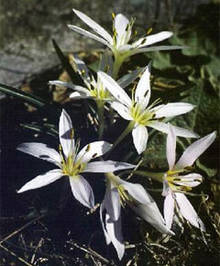The world’s first gene bank for wild plants is to be established in Hungary, reports geographic.hu, the online version of National Geographic magazine’s Hungarian edition. The collection would be stored at the Institute of Agrobotany in Tápiószele, Pest County, and store the genes of 85,000 types of cultivated plants, making it Europe’s fifth largest agrobotany gene bank.

Colchicum hungaricum (Magyar kikerics), one of Hungary’s protected plant species that lives only on the highest hill in the Villány Hills, the Szársomlyó, in Baranya County.
A tender for the proposed wild plant gene bank in Hungary was submitted by the Hungarian ministry of environment to the European Union in December 2007. The tender outlined a five-year program to establish a gene bank for wild plants living in the Carpathian Basin, known as the Pannon biogeographic region. The project will initiate when the tender passes.
The first step of the project will be to research other countries’ seed banks, said Katalin Rodics, an associate of the ministry. In Spain, for example, a project was launched nearly 50 years ago and conserved drought-tolerant plants in gene banks. One question that the process raises, however, is how to best conserve plants that prefer moist environments.
After research, Hungarian experts will collect plants, prioritizing the most endangered endemic species and then seeds that are already being stored. The cost of establishing the collection, to be called Pannon Magbank (Pannon Seed Bank), is estimated at Ft 400 million (roughly 1.5 million). Half of the cost will be covered by the EU and the other half by the ministry. The tender will be evaluated again in August 2008.
Conserving the biodiversity of the Pannon biogeographic region is extremely important, in part to prepare for unforeseeable effects of climate change. “It is important to connect ex-situ [off-site] conservation of cultivated and wild plants, as not only several of our wild plant species are endangered, but there is also a drastic decrease of diversity happening among our cultivated plants,” Rodics said.
While the project is not the “doomsday” Svalbard Global Seed Vault, the Hungarian seed bank is innovative in its own right. Not many other countries has launched their own programs to conserve wild plant species, despite the 1992 ruling at the Convention on Biological Diversity requesting participating countries do so. The international treaty was designed to sustain the diversity of life on Earth and mandated that countries should establish gene banks to conserve at least 60% of endangered wild plant species.
By: All Hungary News
2008-02-25 08:24:00
From: caboodle.hu
Update:
– More Seeds For Doomsday Seed Vault
– Investors Behind Doomsday Seed Vault May Provide Clues to Its Purpose:
The group of investors includes The Bill and Melinda Gates Foundation, The Rockefeller Foundation, Monsanto Corporation, Syngenta Foundation, and the Government of Norway.
– African seed collection first to arrive in Norway on route to Arctic seed vault
– Scientists to capture DNA of trees worldwide for database
Your tittle is extremely confusing.
You should make it much more precise.
The world’s first seed bank for wild species was established in 1966 (see Biological Conservation 1972) in our Universidad Politéctica de Madrid. At least 30-40 seed banks are now strictly devoted to wild species in the seed banks of many botanic gardens (10-12 in Spain since the 80s).
See also the last issues of Seed Science and Technology where high germination rates afte 40 years are reported (Perez-Garcia and others, after 2007).
Please try to be exact in your statements. In general people is well informed today and this type of false statements can only make a deep damage to you.
Cesar Gomez-Campo
Dep- Biologia Vegetal
Universidad Politecnica de Madrid
28040-Madrid, Spain
I have just posted this article.
Maybe it would be a good idea to leave your comment here:
http://www.caboodle.hu/nc/news/news_archive/single_page/article/11/hungary_to_s/?cHash=48e75cb2a3
The original article was in the National Geographic:
http://www.geographic.hu/index.php?act=napi&rov=1&id=11105